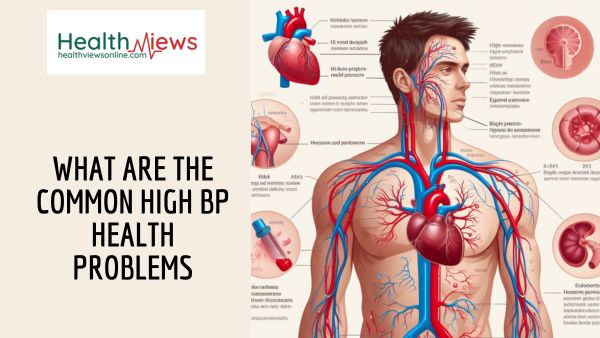High blood pressure, often known as hypertension, is a common and possibly fatal medical condition that affects millions of individuals worldwide. It happens when the force of blood on the artery walls is consistently too strong, which can lead to a variety of health problems and complications. While some common high BP health problems do not often cause noticeable symptoms, it is sometimes referred to as the “silent killer” due to its insidious tendency. It can have serious effects on general health if left untreated or uncontrolled.
In this article, we will look at some of the most prevalent high BP problems, emphasizing the significance of early detection, lifestyle changes, and medical interventions to reduce risks and promote a healthier, longer life.
Also, Read What Is Chronic Kidney Disease? Causes, Symptoms & Treatment
Top 10 Common HIgh BP Health Problems with symptoms, prevention, care tips
1. Heart Disease
Symptoms – Chest pain (angina), shortness of breath, and an irregular heartbeat.
Prevention – Maintain a balanced diet, exercise regularly, limit your salt consumption, and control your stress.
Care tips – Don’t use tobacco or smoke, do physical activity, consume a heart-healthy diet, keep a healthy weight, get plenty of rest, get routine health screenings, and take prescribed medications.
2. Stroke
Symptoms – Sudden numbness or weakness in the face, arm, or leg, confusion, trouble speaking or understanding speech.
Prevention – Control your blood pressure, keep a healthy weight, stop smoking, and limit your alcohol use.
Care tips – If you suffer stroke symptoms, get quick medical attention because time is of the essence for treatment.
Also Read: All About Ischemic Stroke: Causes, Symptoms, Diagnosis, Treatment & Diet
3. Kidney Damage (Nephropathy)
Symptoms – Swelling in the legs, ankles, feet, increased need to urinate, fatigue.
Prevention – Manage your blood pressure, control your blood sugar if you have diabetes, and avoid high-sodium foods.
Care tips – Regularly evaluate kidney function with medical testing and, if necessary, consult with a nephrologist.
4. Eye Problems (Hypertensive Retinopathy)
Symptoms – Blurred vision, visual disturbances, eye bleeding.
Prevention – Control your blood pressure, get frequent eye exams, and live a healthy lifestyle.
Care tips – Follow your ophthalmologist’s advice and monitor changes in your vision.
5. Atherosclerosis (Hardening of the Arteries)
Symptoms – Often asymptomatic until a heart attack or stroke occurs.
Prevention – Eating a well-balanced diet, exercising regularly, quitting smoking, and taking prescribed medications.
Care tips – Consult a cardiologist for ongoing management and monitoring.
Also Read: Highly Rated On the Internet: Top Cardiologists in Mumbai
6. Peripheral Artery Disease (PAD)
Symptoms – Leg pain while walking, cold or numb extremities, sores that won’t heal.
Prevention – Control your blood pressure, cholesterol, and blood sugar levels, and quit smoking.
Care tips – Consult a vascular specialist for an evaluation and treatment options.
Also, Read What is Dialysis: Types, Process, Benefits and Diet for Patients Undergoing Dialysis
7. Dementia and Cognitive Decline
Symptoms – Memory loss, confusion, difficulty concentrating.
Prevention – Control your blood pressure, keep your mind stimulated, and engage in regular physical activity.
Care tips – Seek medical evaluation if the cognitive decline is a concern.
8. Aneurysms
Symptoms – Often asymptomatic until rupture, which can cause severe pain, bleeding, or death.
Prevention – Manage blood pressure, follow a healthy diet, and avoid smoking.
Care tips – For those at risk, regular monitoring and intervention by a vascular expert may be required.
9. Heart Failure
Symptoms – Fatigue, shortness of breath, swollen ankles and legs.
Prevention – Manage your blood pressure, eat a heart-healthy diet, exercise regularly, and take your medications as prescribed.
Care tips – Consult a cardiologist for ongoing heart failure management.
10. Erectile Dysfunction (ED)
Symptoms – Difficulty achieving or maintaining an erection.
Prevention – Control your blood pressure, live a healthy lifestyle, and manage your stress.
Care tips – Consult a urologist about treatment choices and lifestyle changes.
Also Read: Now Know 10 Common Medicines to Treat Erectile Dysfunction in India
In conclusion, high blood pressure, often known as hypertension, is a common health disease that can silently wreak havoc on the body’s organ systems. The common high BP health problems highlight the significance of proactive management and lifestyle changes to limit the risks and effects. Hypertension has a wide range of effects, from heart disease and stroke to kidney damage, eye issues, and cognitive loss.
Prevention is still the most effective technique for dealing with these health issues. Individuals can significantly decrease their chance of acquiring these issues by regulating their high BP Health problems through dietary choices, regular exercise, stress management, and medication as prescribed by a healthcare provider. Because hypertension sometimes advances silently, early detection and monitoring are critical.
Furthermore, recognizing the symptoms and receiving immediate medical assistance when necessary can make a significant difference in properly treating these health conditions. The key components of reducing the negative effects of high blood pressure are regular check-ups, adherence to treatment plans, and a dedication to a heart-healthy lifestyle.
Also, Watch health views web stories: 7 Ways How Mental Health Affects Physical Health





